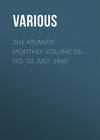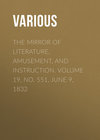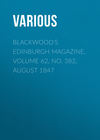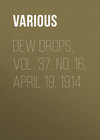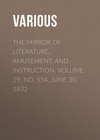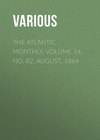Loe raamatut: «The Atlantic Monthly, Volume 06, No. 33, July, 1860», lehekülg 17
The "Providence Journal" deserves the thanks of all students for having called attention to the fact, that, under the proposed tariff, the duties will be materially increased on two classes of foreign books: the cheap ones, like "Bohn's Library,"–and the bulky, but often indispensable ones, such as the "Encyclopaedia Britannica." The new bill, in short, proposes to substitute for the old duty of eight per cent. ad valorem a new one of fifteen cents the pound weight. Could we suspect a Committee of Members of Congress of a joke appreciable by mere members of the human family, could we suppose them in a thoughtless moment to have carried into legislation a mildened modicum of that metaphorical language which forms the staple of debate, we should make no remonstrance. We recognize the severe justice of an ideal avoirdupois in literary criticism. We remember the unconscious sarcasm of the Atlantic Telegraph, as it sank heart-broken under the strain of conveying the answer of the Heavy Father of our political stage to the graceful "good-morning" of Victoria. The enthusiastic member of the Academy of Lagado, who had spent eight years in a vain attempt to extract sunbeams from cucumbers, might have found profitable employment in smelting the lead even from light literature, not to speak of richer deposits. Under an act thus dubiously worded, and in a country which makes Bancroft a collector of the customs and Hawthorne a weigher and gauger, the works of an Alison and a Tupper would be put beyond the reach of all but the immensely rich. The man of moderate means would be deprived of the exhaustless misinformation of the Scottish Baronet, who has so completely disproved the old charge against his countrymen of possessing an ingenium perfervidum, (which Dr. Johnson would have translated by brimstone temperament,) and of the don't-fail-to-spread-your-umbrella-when-it-rains- or-you'll-spoil-your-hat wisdom of the English Commoner, who seems to have named his chief work in a moment of abnormal inspiration, since it has become proverbial as the severest test of human philosophy.
But we cannot suspect the Congressional Committee of a joke, still less of a joke at the expense of those anglers in the literary current whose tackle, however bare of bait, never fails of a sinker at the end of every line. They have been taught to look upon books as in no wise differing from cotton and tobacco, and rate them accordingly by a merely material standard. It has been the dealers in books, and not the makers of them, who have hitherto contrived to direct public opinion in this matter. We look upon Public Opinion with no superstitious reverence,–for Tom's way of thinking is none the wiser because the million other Toms and Dicks and Harries agree with him,–nevertheless, even a fetish may justly become an object of respectful interest to one who is to be sacrificed to it.
However it may be with iron, wool, and manufactured cotton, it is clear that a duty on books is not protective of American literature, but simply a tax on American scholarship and refinement. The imperfectness of our public libraries compels every student to depend more or less upon his own private collection of books; and it is a fact of some significance, that, with the single exception of Hildreth, all our prominent historians, Sparks, Irving, Bancroft, Prescott, Ticknor, Motley, and Palfrey, have been men of independent fortune. If anything should be free of duty, it should seem to be the material of thought.
If Congress be really desirous of doing something for the benefit of American authors, it would come nearer the mark, if it directed its attention to the establishment on equitable grounds of some system of International Copyright. A well-considered enactment to this end would, we are convinced, be quite as advantageous to the manufacturers as to the producers of books. "We believe that a majority of the large publishing houses of the country have been gradually convinced of the inconveniences of the present want of system. Many of them have found it profitable to enter into an agreement with popular English authors for the payment of copyright, and works thus reprinted cost the buyer no more than under the privateering policy. But without some definite establishment of legal rights and remedies, the publisher is at the mercy of a dishonorable, sometimes of a vindictive competition, and must run the risk of having the market flooded within a week with a cheaper and inferior edition, reprinted from the sheets of his own which had been honorably paid for. We do not pretend to argue the question of literary property, the principle of it being admitted in the fact that we have any copyright-laws at all. Our wish is to show, that, in the present absence of settled law, the honest publisher is subjected to risks from the resultant evils of which the whole reading community suffers. The publisher, to protect himself, is forced to make his reprint as cheaply as possible, and to hurry it through the press with the disregard of accuracy inseparable from hasty publication,–while the reader is put in possession of a book destructive of eyesight, crowded with blunders, and unsightly in appearance. Maps and plates are omitted, or copied so carelessly as to be worse than useless; and whoever needs the book for study or reference must still buy the original edition, made more costly because imported in single copies, and because taxed for the protection of a state of things discreditable in every way, and not only so, but hostile to the true interests of both publishers and public.
We do not claim any protection of American authorship from foreign competition, but we cannot but think it unfair that British authorship should be protected (as it now practically is) at the cost of our own, and for the benefit of such publishers as are willing to convey an English book without paying for it. The reprint of a second-rate work by an English author has not only the advantage of a stolen cheapness over a first-rate one on the same subject by an American, but may even be the means of suppressing it altogether. The intellectual position of an American is so favorable for the treatment of European history as to overbalance in some instances the disadvantages arising from want of access to original documents; yet an American author whose work was yet in manuscript could not possibly compete with an English rival, even of far inferior ability, who had already published. If, within the last few years, a tolerably popular history of France had been published in England, and cheaply reprinted here, (as it surely would have been,) we doubt whether Mr. Godwin would have undertaken his laborious and elaborate work,–or, if he had, whether he would have readily found a bookseller bold enough to pay an adequate price for the copyright. And it is to be remembered that an American publisher gives this preference to an English over an American book simply because he can get it for nothing, by defrauding its author of the just reward of his industry or genius. That an author loses his equitable claim to copyright for the simple reason that by publication he has put himself in our power is an argument fit to be used only by one who would make use of a private letter that had accidentally come into his possession to the damage of the writer.
The necessity of some kind of equitable arrangement was so strongly felt by American publishers that a kind of unwritten law gradually established itself among them. It was tacitly understood, that, when a publisher had paid an English author for advance sheets, no rival American edition should be published. But it already appears too plainly that an arrangement with no guaranty but a private sense of honor is liable to constant infringement for the gratification of personal enmity, or in the hope of immediate profit. The rewards of uprightness and honorable dealing are slow in coming, while those of unscrupulous greed are immediate, even though dirty. Under existing circumstances, free-trade and fair-play exist only in appearance: for the extraordinary claim has been set up, that an American bookseller has an exclusive right to all the future works of an English author any one of whose former productions he has reprinted, whether with or without paying for it; so that, however willing another publisher may be to give the author a fair price for his book, or however desirous the latter may be to conclude such a bargain, it is practically impossible, so long as privateering is tolerated in the trade.
We have said nothing of the advantages which would accrue to our own authors from a definite settlement of the question of international copyright between England and America. How great these would be is plain from the fact that the editions of American books republished in England are already numbered by thousands. With the growth of the English Colonies the value to an American author of an English copyright is daily increasing. Indeed, it is a matter of consideration for our publishers, whether Canada may not before long retaliate upon them, and by cheaper reprints become as troublesome to them as Belgium once was to France.
It is not creditable that America should be the last of civilized nations to acknowledge the justice of an author's claim to a share in the profits of a commercial value which he has absolutely created. England is more liberal to our authors than we to hers, but it is only under certain strictly limited contingencies that an American can acquire copyright there. Were all our booksellers as scrupulous as the few honorably exceptional ones among them now are, there would be no need of legislative regulation; but, in the present condition of things, he who undertakes to reprint an English book which he has honestly paid for is at the mercy of whoever can get credit for poor paper and worse printing. There is no reason why a distinction should be made between copy-right and patent-right; but, if our legislators refuse to admit any abstract right in the matter, they might at least go so far as to conclude an international arrangement by which a publisher in either country who was willing to pay for the right of publication should be protected in its exercise. No just objection could be made to a plan of this kind, which, if not so honest as a general international law of copyright, would be profitable to our publishers, and to such of our authors at least as had acquired any foreign reputation.
RECENT AMERICAN PUBLICATIONS
RECEIVED BY THE EDITORS OF THE ATLANTIC MONTHLY
The Church of the First Three Centuries; or, Notices of the Lives and Opinions of Some of the Early Fathers, with Special Reference to the Doctrine of the Trinity; illustrating its Late Origin and Gradual Formation. By Alvan Lamson, D.D. Boston. Walker, Wise, & Co. 8vo. pp. xii., 352.
Plato's Apology and Crito; with Notes, by W.S. Tyler, Graves Professor of Greek in Amherst College. New York. Appleton & Co. 12mo. pp. 180. 75 cts.
Poems. By William H. Holcombe, M.D. New York. Mason Brothers. 12mo. pp. 360. $1.25.
Science in Theology. Sermons preached in St. Mary's, Oxford, before the University. By Adam S. Farrar, M.A., F.G.S., F.R.A.S., Michel Fellow of Queen's College, Oxford; late One of the Select Preachers to the University; and Preacher at the Chapel Royal, Whitehall. Philadelphia. Smith, English, & Co. 12mo. pp. 250. 85 cts.
Remembered Words from the Sermons of Rev. I. Nichols, late Pastor of the First Parish in Portland, Maine. Boston. Crosby, Nichols, Lee, & Co. 12mo. pp. viii., 141. 75 cts.
The Throne of David; from the Consecration of the Shepherd of Bethlehem to the Rebellion of Prince Absalom. Being an Illustration of the Splendor, Power, and Dominion of the Reign of the Shepherd, Poet, Warrior, King, and Prophet, Ancestor and Type of Jesus; in a Series of Letters addressed by an Assyrian Ambassador, Resident at the Court of Saul and David, to his Lord and King on the Throne of Nineveh; wherein the Glory of Assyria, as well as the Magnificence of Judea, is presented to the Reader as by an Eye-witness. By the Rev. J.H. Ingraham, LL.D., Author of "The Prince of the House of David," and of "The Pillar of Fire." Philadelphia. Evans. 12mo. pp. 603. $1.25.
The Boy-Inventor; a Memoir of Matthew Edwards, Mathematical Instrument- Maker. Boston. Walker, Wise, & Co. 16mo. pp. 109. 50 cts.
History of the Republic of the United States of America, as traced in the Writings of Alexander Hamilton and of his Contemporaries. By John C. Hamilton. Volume VI. New York. Appleton & Co. 8vo. pp. xii., 620. $2.50.
A Course of Exercises in All Parts of French Syntax, methodically arranged after Poitevin's "Syntaxe Française"; to which are added Ten Appendices. Designed for the Use of Academies, Colleges, and Private Learners. By Frederick T. Winkelmann, A.M., Ph.D., Professor of Latin, French, and German in the Packer Collegiate Institute of Brooklyn, N.Y. New York. Appleton & Co. 16mo. pp. xvi., 366. $1.00.
Letters on the Divine Trinity, addressed to Henry Ward Beecher. By B.F. Barrett. New York. Mason Brothers. 16mo. pp. 137. 50 cts.
Echoes of Harper's Ferry. By James Redpath. Boston. Thayer & Eldridge. 12mo. pp. 513. $1.25.
The Right of American Slavery. By T.W. Hoit, of the St. Louis Literary and Philosophical Association. Southern and Western Edition. St. Louis. L. Bushnell. 8vo. pp. 51. 25 cts.
El Fureidîs. By the Author of "The Lamplighter" and "Mabel Vaughan." Boston. Ticknor & Fields. 16mo. pp. iv., 379. $1.00.
Dickens's Short Stories. Containing Thirty-One Stories never before published in this Country. By Charles Dickens. Philadelphia. Peterson & Brothers. 12mo. pp. 298. $1.25.
A Mother's Trials. By the Author of "My Lady." New York. Harper & Brothers. 12mo. pp. 400. $1.00.
Letters of Alexander von Humboldt to Varnhagen von Ense. From 1827 to 1858. With Extracts from Varnhagen's Diaries, and Letters of Varnhagen and Others to Humboldt.
Translated from the Second German Edition, by Friedrich Kapp. New York. Rudd & Carleton. 12mo. pp. 407. $1.25.
Our Living Representative Men. From Official and Original Sources. By John Savage. Philadelphia. Childs & Peterson. 12mo. pp. xxx., 503. $1.25.
Leaves of Grass. By Walt Whitman. Boston. Thayer & Eldridge. 12mo. pp. 456. $1.25.
Salmagundi; or, The Whim-Whams and Opinions of Launcelot Langstaff, Esq., and Others. By William Irving, James Kirke Paulding, and Washington Irving. Printed from the Original Edition, with a Preface and Notes by Evert A. Duyckinck. New York. Putnam. 12mo. pp. xiv., 412. $1.50.
Text-Book in Intellectual Philosophy, for Schools and Colleges; containing an Outline of the Science, with an Abstract of its History. By J.T. Champlin, D.D., President of Waterville College. Boston. Crosby, Nichols, Lee, & Co. 12mo. pp. 240. 76 cts.
Katherine Morris: an Autobiography. By the Author of "Step by Step" and "Here and Hereafter." Boston. Walker, Wise, & Co. 12mo. pp. 353. $1.00.
The School and Family Primer: Introductory to the Series of School and Family Readers. By Marcius Willson, Author of "American History," "Outlines of General History," etc. New York. Harper & Brothers. 12mo. pp. 48. 15 cts.
The First Reader, of the School and Family Series. By Marcius Willson. New York. Harper & Brothers. 12mo. pp. 84. 20 cts.
The Second Reader, of the School and Family Series. By Marcius Willson. New York. Harper & Brothers. 12mo. pp. 166. 30 cts.
The Third Reader, of the School and Family Series. By Marcius Willson. New York. Harper & Brothers. 12mo. pp. 264. 50 cts.
The Fourth Reader, of the School and Family Series. By Marcius Willson. New York. Harper & Brothers. 12mo. pp. 360. 66 cts.
Kit Kelvin's Kernels. With Illustrations. New York. Rollo. 12mo. pp. 270. $1.00.
Sermons. By Joseph Addison Alexander, D.D. In Two Volumes. New York. Charles Scribner. 12mo. pp. 414, 425. $2.50.
Lectures on Natural History: its Relations to Intellect, Taste, Wealth, and Religion. By P.A. Chadbourne, Professor, etc. New York. A.S. Barnes & Burr. 12mo. pp. 160.
The Elementary Spelling-Book. Being an Improvement on "The American Spelling-Book." By Noah Webster, LL.D. New York. Appleton & Co. 16mo. pp. 168. 12 cts.
Home and College. A Public Address delivered in the Hall of the Massachusetts House of Representatives, March S, 1860. By F.D. Huntington, Preacher to the University, and Plummer Professor of Christian Morals in Harvard College. Boston. Crosby, Nichols, Lee, & Co. 12mo. pp. 70. 50 cts.
What will He Do with It? By Pisistratus Caxton. A Novel. By Sir Edward Bulwer Lytton, Bart. Library Edition. In Three Volumes. Philadelphia. Lippincott & Co. 16mo. pp. 408, 444, 442. $3.00.
Devereux. A Tale. By Sir Edward Bulwer Lytton, Bart. Library Edition. In Two Volumes. Philadelphia. Lippincott & Co. 12mo, pp. 344, 350. $2.00.
The Last Days of Pompeii. By Sir Edward Bulwer Lytton, Bart. Library Edition. In Two Volumes. Philadelphia. Lippincott & Co. 12mo. pp. 320, 334. $2.00.
Norton's Hand-Book to Europe; or, How to Travel in the Old World. By J.H. Siddons. New York. Charles B. Norton. 12mo. pp. 243. $1.00.
Church Choral Book. Containing Tunes and Hymns for Congregational Singing, and adapted to Choirs and Social Worship. By B.F. Baker and J.W. Tufts. Boston. Crosby, Nichols, Lee, & Co. 12mo. pp. 208.
Home as Found. Sequel to "Homeward Bound." By J. Fenimore Cooper. Illustrated from Drawings by F.O.C. Darley. New York. W.A. Townsend & Co. 12mo. pp. 507. $1.50.
The West Indies and the Spanish Main. By Anthony Trollope, Author of "Doctor Thorne," etc. New York. Harper & Brothers. 12mo. pp. 385. $1.00.
The New Discussion of the Trinity, Containing Notices of Professor Huntington's Recent Defence of that Doctrine, reprinted from Various Sources; together with Sermons by Rev. Thos. Starr King and Dr. Orville Dewey. Boston. Walker, Wise, & Co. 12mo. pp. viii., 244. 63 cts.
Life of George Washington. By Washington Irving. National Edition. Vol. I. New York. Putnam. 12mo. pp. xvi., 444. $1.50.
American National Lyrics and Sonnets. By O. Prescott Hiller, Author of "The Pleasures of Religion, and Other Poems." Boston. Otis Clapp. 16mo. pp. viii., 80.
Hawksview. A Familiar History of our Own Times. By Holme Lee, Author of "Against Wind and Tide," etc. New York. W.A. Townsend & Co. 12mo. pp. 330. $1.00.
Forty Years' Familiar Letters of James W. Alexander, D.D. Constituting, with the Notes, a Memoir of his Life. Edited by his Surviving Correspondent, John Hall, D.D. In Two Volumes. New York. Charles Scribner. 12mo. pp. viii., 412, 379. $2.50.
A Discourse on the Life, Character, and Genius of Washington Irving, delivered before the New York Historical Society, at the Academy of Music in New York, April 3, 1860. By William Cullen Bryant. New York. Putnam. 12mo. pp. 46.
Analytic Orthography; an Investigation of the Sounds of the Voice, and their Alphabetic Notation; including the Mechanism of Speech, and its Bearing upon Etymology. By S.S. Haldeman, A.M., Professor in Delaware College, etc. Philadelphia. Lippincott & Co. 4to. pp. viii., 148.
The Elements of Christian Doctrine, and its Development. Five Sermons, preached before the South Congregational Society, Boston, in January, February, and March, 1860, and printed at its Request. By Edward E. Hale. Boston. Walker, Wise, & Co. pp. 68.
Mary Bunyan, the Blind Dreamer's Daughter. A Tale of Religious Persecution. By Sallie Rochester Ford, Author of "Grace Truman." New York. Sheldon & Co. 12mo. pp. 488. $1.00.
Unitarianism Defined. The Scripture Doctrine of the Father, Son, and Holy Ghost. A Course of Lectures, by Frederick A. Farley, D.D., Pastor of the Church of the Saviour, Brooklyn, N.Y. Boston. Walker, Wise, & Co. 12mo. pp. 272.
State-Pride. An Oration, delivered before the Calliopean and Polytechnic Societies of the State Military School, at Charleston. By William D. Porter. Charleston. Walker, Evans, & Co. 8vo. pp. 23.
Student-Songs. Kenyon College, Gambier, Ohio. Pittsburgh. W.S. Haven. 12mo. pp. 50.
Tom Brown at Oxford: a Sequel to School-Days at Rugby. By Thomas Hughes, Author of "School-Days at Rugby." Part VI. Boston. Ticknor & Fields. 16mo. pp. 72. 12 Cts.
The Countess and the Page. A Tale of Florentine Society. By G.W.M. Reynolds. Philadelphia. Peterson & Brothers. 8vo. pp. 190. 50 cts.
Lucile. By Owen Meredith, Author of "The Wanderer," "Clytemnestra," etc. Boston. Ticknor & Fields. 32mo. pp. 352. 75 cts.
